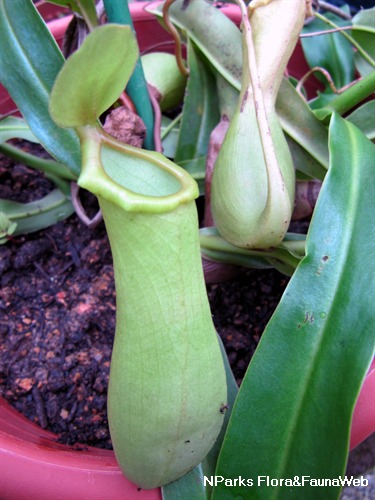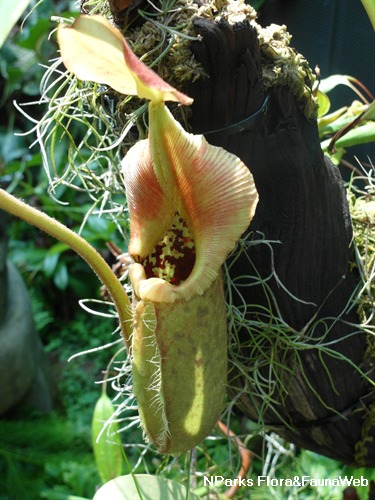
Name
Classifications and Characteristics
| Plant Division | Angiosperms (Flowering Seed Plants) |
|---|---|
| Plant Growth Form | Climber |
Biogeography
| Native Distribution | Philippines |
|---|
Description and Ethnobotany
| Growth Form | Carnivorous plant with a climbing growth habit. |
|---|---|
| Foliage | Smooth, glossy leaves are leathery and spirally arranged. The leaf tip is modified to form either tendrils which help the plant climb or cylindrical pitcher traps which catch insects. The pitcher traps are yellowish green, but form a red blush under bright light. The peristome (the lip of the pitcher) is wide and flared, while the pair of wings are reduced to a narrow fringe of hairs. |
| Habitat | This hybrid occurs where the range of its parents species Nepenthes alata and Nepenthes ventricosa overlap. N. ventricosa is a highland species, while N. alata is a lowland species. The hybrid has intermediate characteristics and can grow in a variety of climates. |
| Taxonomy | Nepenthes x ventrata is a natural hybrid between Nepenthes alata and Nepenthes ventricosa. |
| Cultivation | Nepenthes x ventrata has been widely propagated by tissue culture and is readily available on the market. The pitchers will develop an attractive red colour when exposed to 6-8 hours of full sun. It grows well in a moist, but well-drained, low nutrient media, such as 50% perlite or sand and 50% peat moss or sphagnum moss. Keep the environment humid by misting occasionally and not placing it in an air-conditioned environment. |
| Etymology | The specific epithet ventrata is a combination of the specific epithets of its parent species (ventricosa and alata). |
Landscaping Features
| Desirable Plant Features | Ornamental Foliage |
|---|---|
| Landscape Uses | Interiorscape/ Indoor Plant, Suitable for Hanging Baskets |
| Thematic Landscaping | Marsh Garden |
Plant Care and Propagation
| Light Preference | Semi-Shade |
|---|---|
| Water Preference | Moderate Water, Occasional Misting |
| Rootzone Tolerance | Moist Soils |
Image Repository
Others
| Master ID | 32577 |
|---|---|
| Species ID | 6989 |
| Flora Disclaimer | The information in this website has been compiled from reliable sources, such as reference works on medicinal plants. It is not a substitute for medical advice or treatment and NParks does not purport to provide any medical advice. Readers should always consult his/her physician before using or consuming a plant for medicinal purposes. |


.jpg)

.jpg)